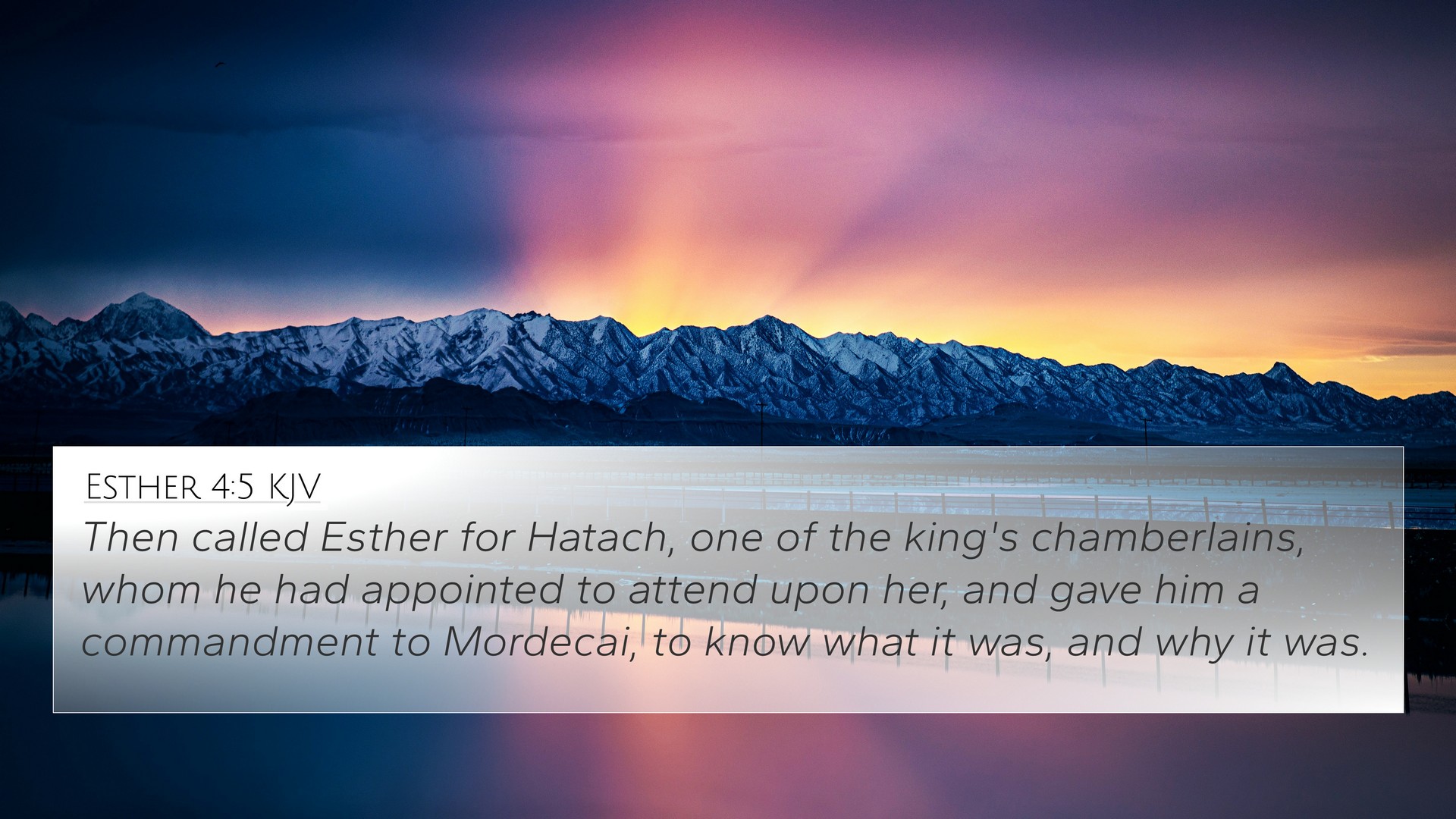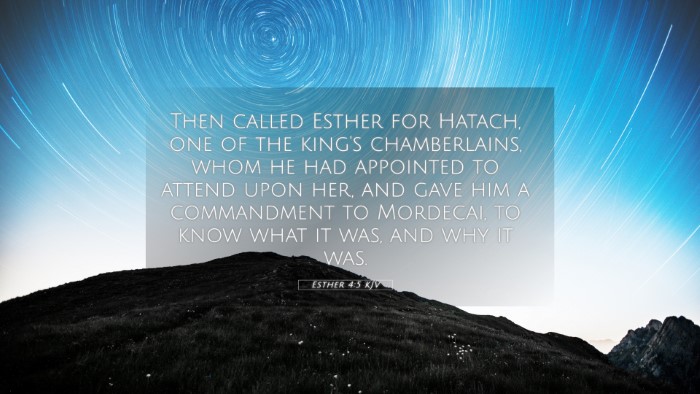Old Testament
Genesis Exodus Leviticus Numbers Deuteronomy Joshua Judges Ruth 1 Samuel 2 Samuel 1 Kings 2 Kings 1 Chronicles 2 Chronicles Ezra Nehemiah Esther Job Psalms Proverbs Ecclesiastes Song of Solomon Isaiah Jeremiah Lamentations Ezekiel Daniel Hosea Joel Amos Obadiah Jonah Micah Nahum Habakkuk Zephaniah Haggai Zechariah MalachiEsther 4:5 Similar Verses
Esther 4:5 Cross References
Then called Esther for Hatach, one of the king's chamberlains, whom he had appointed to attend upon her, and gave him a commandment to Mordecai, to know what it was, and why it was.
Uncover the Rich Themes and Topics of This Bible Verse
Listed below are the Bible themes associated with Esther 4:5. We invite you to explore each theme to gain deeper insights into the Scriptures.
Esther 4:5 Cross Reference Verses
This section features a detailed cross-reference designed to enrich your understanding of the Scriptures. Below, you will find carefully selected verses that echo the themes and teachings related to Esther 4:5 KJV. Click on any image to explore detailed analyses of related Bible verses and uncover deeper theological insights.

1 Corinthians 12:26 (KJV) »
And whether one member suffer, all the members suffer with it; or one member be honoured, all the members rejoice with it.
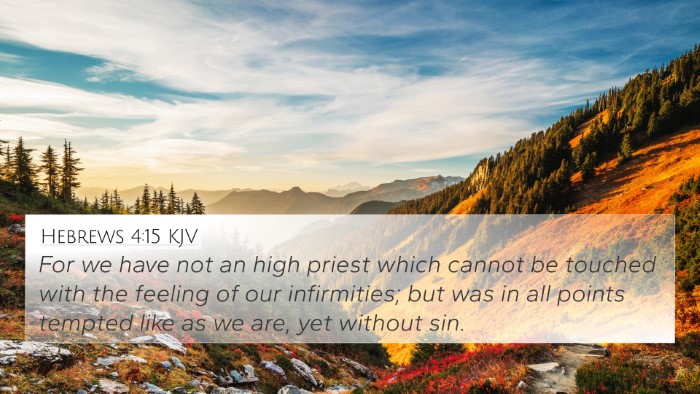
Hebrews 4:15 (KJV) »
For we have not an high priest which cannot be touched with the feeling of our infirmities; but was in all points tempted like as we are, yet without sin.
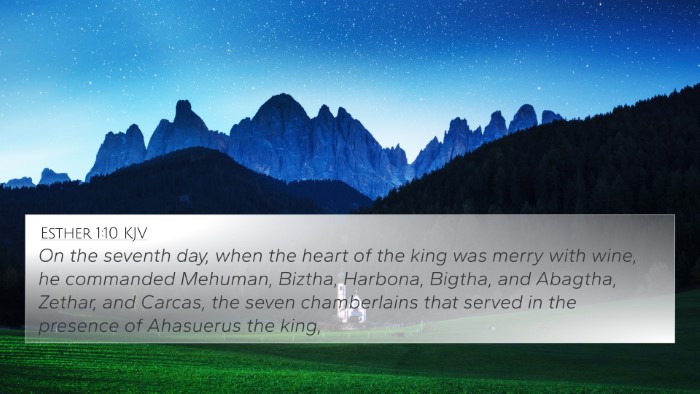
Esther 1:10 (KJV) »
On the seventh day, when the heart of the king was merry with wine, he commanded Mehuman, Biztha, Harbona, Bigtha, and Abagtha, Zethar, and Carcas, the seven chamberlains that served in the presence of Ahasuerus the king,

Esther 1:12 (KJV) »
But the queen Vashti refused to come at the king's commandment by his chamberlains: therefore was the king very wroth, and his anger burned in him.
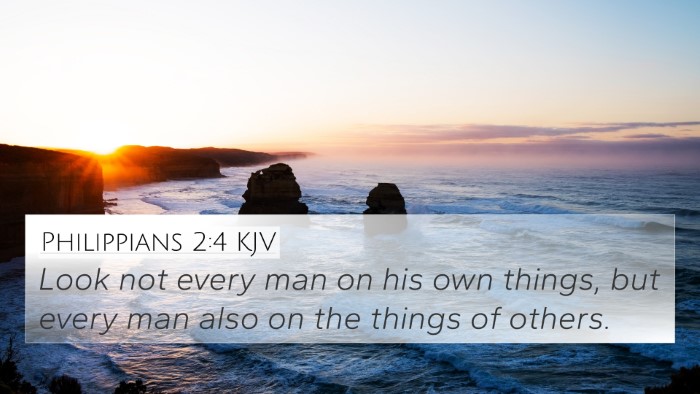
Philippians 2:4 (KJV) »
Look not every man on his own things, but every man also on the things of others.
Esther 4:5 Verse Analysis and Similar Verses
Understanding Esther 4:5
Esther 4:5 states, "Then Esther called for Hathach, one of the king's eunuchs, whom he had appointed to attend her, and gave him a command concerning Mordecai, to learn what and why this was." This pivotal verse in the Book of Esther highlights the urgency and gravity of the situation faced by Esther and her community. Here, Esther reaches out to Hathach to inquire about the distress of her relative Mordecai, who is mourning due to the decree to annihilate the Jews.
Commentary Insights
Insights from various public domain commentaries shed light on the multiple layers of meaning within Esther 4:5:
- Matthew Henry: Henry emphasizes the significance of communication in times of crisis. Esther takes proactive steps to understand the gravity of the situation, illustrating the importance of wisdom and discernment in her actions.
- Albert Barnes: Barnes focuses on the character of Esther as a leader. Her ability to remain composed and seek information instead of acting impulsively showcases strong leadership qualities. This act can be seen as a testament to her integrity and concern for her people.
- Adam Clarke: Clarke highlights the role of Hathach, noting that even minor characters play crucial roles in the unfolding of God's providence. The act of sending Hathach demonstrates Esther's reliance on trusted individuals and the importance of community in facing adversity.
Significance of Inquiry and Understanding
In this verse, Esther's inquiry reflects a broader biblical theme: the necessity of seeking knowledge and understanding in moments of uncertainty. This theme resonates through various scriptures, prompting us to consider the ways we engage with information.
Thematic Connections to Esther 4:5
Esther 4:5 serves as a crossroads for various biblical themes. Notably:
- Leadership in Crisis: Esther's proactive stance prompts readers to reflect on how they seek counsel and direction during tumultuous times.
- The Role of Trusted Advisors: The mention of Hathach illustrates the importance of surrounding oneself with reliable individuals who can guide one's decisions.
- Compassion and Community: Esther's concern for Mordecai underscores the command to love one another, as seen in other scriptures (e.g., John 13:34).
Bible Cross References
Esther 4:5 connects with numerous other scriptures, facilitating a greater understanding of its implications:
- Mordecai's Mourning: Esther 4:1 - Highlights the context of Mordecai's grief.
- Seeking Wisdom: Proverbs 4:7 - "Wisdom is the principal thing; therefore get wisdom." This reinforces Esther's pursuit of understanding.
- Responsibility of Leaders: James 4:17 - "To him who knows to do good and does not do it, to him it is sin." Esther’s actions are indicative of her responsibility to her people.
- Communication: Proverbs 25:11 - "A word fitly spoken is like apples of gold in pictures of silver." The relevance of Esther's inquiry can be linked to the importance of timely communication.
- God’s Providence: Romans 8:28 - "And we know that all things work together for good to those who love God." The unfolding events demonstrate God's plan through Esther's responses.
- The Power of Prayer: Philippians 4:6 - "Be anxious for nothing, but in everything by prayer and supplication." Esther's distress could lead to communal prayer, which reflects biblical teachings about collective supplication.
- Community Support: Galatians 6:2 - "Bear one another’s burdens, and so fulfill the law of Christ." Mordecai's situation represents the burdens we bear within a community.
Cross-Referencing Biblical Texts
Understanding Esther 4:5 involves a comparative analysis of related verses and themes throughout scripture. The practice of cross-referencing Biblical texts enhances one’s study and interpretation, revealing the unity of the biblical narrative.
Tools and Methods for Cross-Referencing
When engaging in Bible cross-reference studies, consider the following resources and methods:
- Bible Concordance: A useful tool for finding specific words and associated verses.
- Bible Cross-Reference Guide: Helps identify thematic connections and parallels.
- Cross-Reference Search Techniques: Understanding how to navigate scripture for thematic studies.
- Bible Reference Resources: Utilizing commentaries, dictionaries, and study guides can deepen understanding.
Conclusion
Esther 4:5 stands as a powerful reminder of the critical nature of understanding, communication, leadership, and community in the face of adversity. By exploring this verse and its connections to other biblical texts, we gain a more profound appreciation of the scriptural narrative's richness and the overarching themes of faith, resilience, and divine providence.
